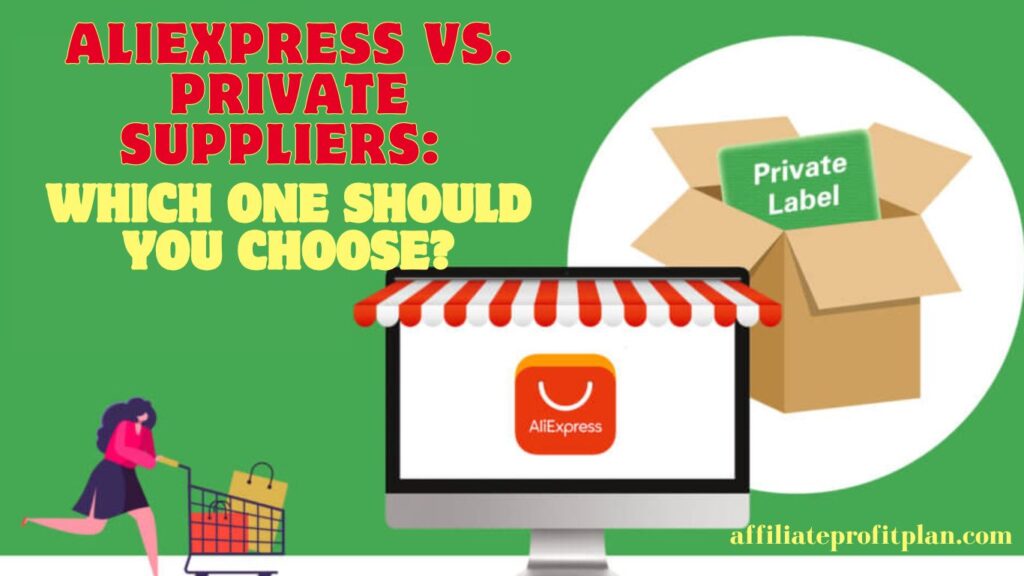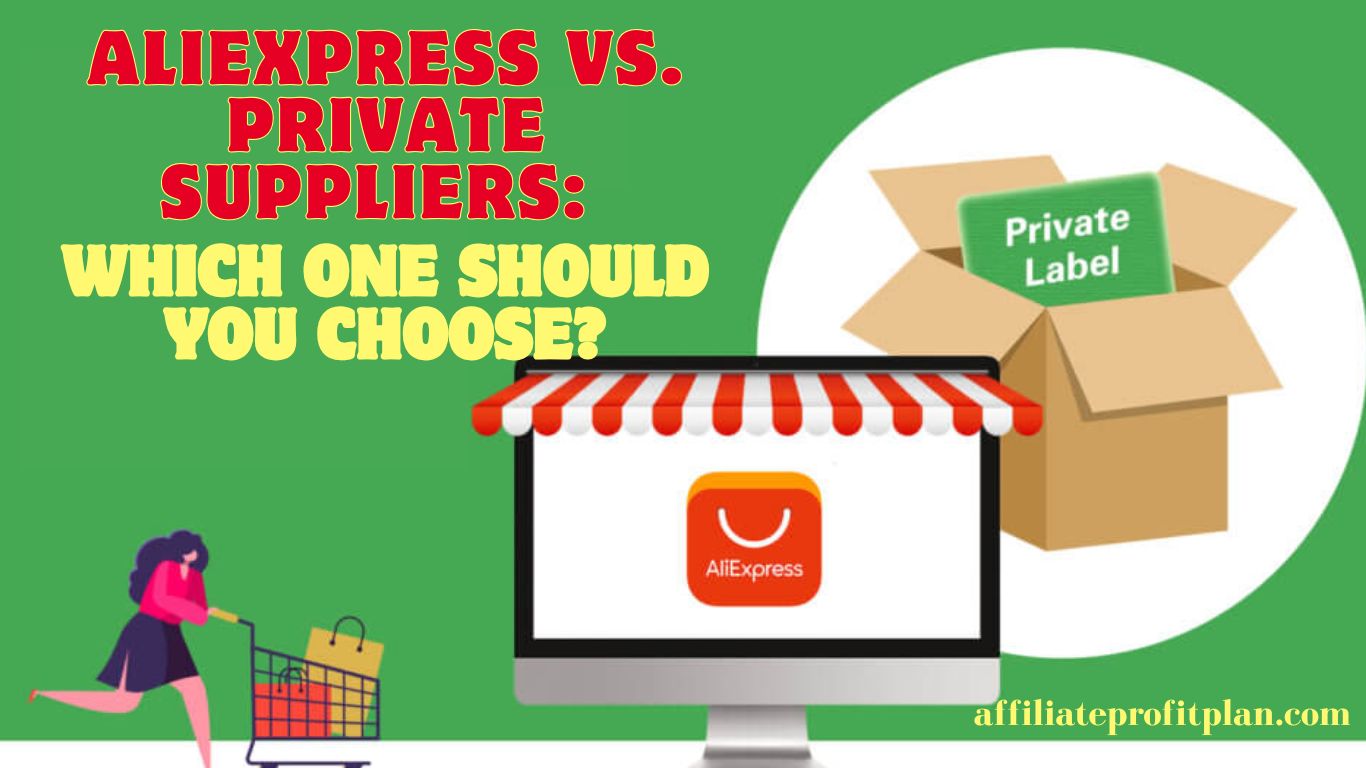Welcome to my article AliExpress vs. Private Suppliers: Which One Should You Choose? When it comes to dropshipping, the supplier debate is as heated as pineapple on pizza. Should you go with AliExpress, the giant marketplace with millions of products and low entry barriers, or should you try your luck with private suppliers, the more exclusive and, dare we say, sophisticated choice? The answer isn’t as straightforward as you might think, and the decision can make or break your eCommerce business. After all, the supplier you choose can affect everything from your profit margins to customer satisfaction (and let’s not even mention those pesky shipping delays).
In this article, we’re diving deep into the AliExpress vs. private suppliers debate. We’ll look at product quality, shipping times, pricing, reliability, and even the ability to build your brand. Whether you’re just starting out and trying to keep costs low or you’re ready to take your dropshipping business to the next level with faster delivery and personalized products, understanding the pros and cons of both options will help you make an informed decision. So, grab your coffee (or tea, if you’re more of a chill entrepreneur) and let’s break down these two popular sourcing routes, so you can choose the one that’s right for you. Spoiler alert: There’s no one-size-fits-all answer, but we’ll make sure you’re equipped to pick your champion!
Access My Proven Blueprint for $50-$100 Daily Income – Watch This FREE Video Now >>>

Product Quality: Consistency vs. Variety
The age-old debate—quality over quantity. When it comes to dropshipping, finding that sweet spot between offering a variety of products and ensuring consistent quality is like trying to find the perfect balance between your morning coffee and the amount of time you’re willing to spend scrolling through memes. It’s a delicate art.
Let’s start with AliExpress. The platform is an absolute smorgasbord of products—you name it, it’s probably on there. Want to sell phone cases, LED lights, or quirky socks? Done. Variety is where AliExpress shines. You can test out thousands of products without committing to a large purchase. Need something new and different for your store? AliExpress has your back. But here’s the kicker—quality can be hit or miss. Because you’re dealing with multiple sellers, some products will be top-notch, while others might feel like they were made with bubblegum and prayer. And you won’t know the difference until your customer writes a lovely review like, “This didn’t even last a week.” Ouch.
Now, let’s talk about private suppliers. When you go private, you’re typically working with verified manufacturers who can offer better control over product quality. These suppliers are less likely to leave you hanging with a cheap knock-off. The consistency here is a major plus—you can count on your products being the same quality each time. So, if your customers get the same product multiple times, they’ll know exactly what to expect. Building a reputation for consistent quality is priceless when it comes to branding. However, there’s a trade-off: You may have fewer options in terms of variety. Private suppliers typically offer a curated selection, so you’re limited to the items they produce. But hey, fewer options can often lead to better focus on what really works in your niche.
In the end, it boils down to what’s more important for your business right now: testing a wide variety of products (hello, AliExpress) or focusing on delivering consistent, high-quality products (cue the private suppliers). Either way, make sure you’re not settling for just good enough—your customers will thank you for it.
Shipping Time: Slow vs. Speedy Delivery
Let’s be real—no one likes waiting. We’ve all had that moment of eagerly tracking a package, only to find out that it’s currently lounging somewhere halfway across the world, sipping a piña colada in transit. In the world of dropshipping, shipping time can be the difference between a happy customer and an angry review. So, let’s break down the difference between slow shipping (thanks, AliExpress) and speedy delivery (hello, private suppliers).
Starting with AliExpress—it’s the king of low-cost products but also the reigning champ of slow shipping times. If you’re dropshipping from AliExpress, you’re likely looking at shipping times of anywhere between 2-6 weeks. And while they offer some decent options like AliExpress Standard Shipping and ePacket, which are affordable, let’s face it—waiting for a month (or more) for your item to arrive can be a big buzzkill for customers. It’s like telling them you’re going to a concert in two months, and they’re like, “Great, but I want it now!”
However, the upside to this slower shipping is that it keeps your costs down—and for some buyers, the long wait is just part of the deal, especially if they’re getting a great price. AliExpress also has warehouses in the U.S. and Europe, which can speed things up a bit (but don’t expect miracles). So while your shipping is slow, it’s cheap, and you might be able to get away with it for low-ticket items that aren’t as urgent for your customers.
On the flip side, private suppliers are all about that speedy delivery life. If you’ve got a supplier offering DHL, FedEx, or UPS, you’re looking at shipping times of 7-15 days, sometimes even faster if they have local warehouses. Faster shipping can feel like a VIP experience for your customers—and trust us, they’ll remember it. It’s also way easier to keep customers happy when their orders arrive in a reasonable time frame. And let’s not forget that quick delivery often reduces your risk of refunds and chargebacks. The downside? Faster shipping comes at a higher cost, which means you need to factor in the price difference when pricing your products. But hey, it might be worth it if it means less waiting, fewer complaints, and more happy repeat customers.
At the end of the day, the choice is simple: AliExpress will save you some serious cash upfront, but with the cost of slower delivery. Private suppliers will give you speedier, more reliable shipping (and let’s be real, who doesn’t love tracking a package in real-time?)—but at a slightly higher price point. It all comes down to what your customers care about most: Is the price the most important factor, or is a fast, reliable delivery worth the extra cost?
Pricing & Profit Margins: Cheap vs. Custom Deals
When it comes to pricing and profit margins, the difference between AliExpress and private suppliers can feel like the difference between buying a latte at your local café or brewing your own at home. Both options have their perks, but the way you go about it can either save you a few bucks—or cost you a lot more.
Access My Proven Blueprint for $50-$100 Daily Income – Watch This FREE Video Now >>>
Let’s start with AliExpress—the cheapest option for a reason. With AliExpress, you can easily find products at rock-bottom prices, which is perfect if you’re a newbie just dipping your toes into the dropshipping waters. Want to test out a bunch of products without breaking the bank? AliExpress is your playground. You can sell products with a low upfront cost, and with no minimum order quantities (MOQ), you don’t need to worry about committing to a huge stockpile. But here’s the catch—because the prices are low, your profit margins can be pretty tight. You’re typically looking at $1-$5 margins per product, and while that might seem fine at first, those profits add up slowly—especially when you’re factoring in advertising costs and shipping fees.
The real kicker? Price fluctuations. With multiple sellers offering similar products, the price of your products on AliExpress can change at the drop of a hat. One day, you’re making a decent margin, and the next, you’re scrambling to adjust your prices. Plus, the cheapest options aren’t always the best quality—and in the long run, that can hurt your brand (and your wallet) if you have to deal with refunds or returns.
Now, let’s talk about private suppliers. When you work directly with manufacturers, you’re likely dealing with better pricing for bulk orders, meaning higher profit margins. You can often negotiate custom deals based on the volume you’re purchasing, which can lead to much better unit prices and greater profit potential. However, the catch here is that private suppliers require higher upfront costs—usually with minimum order quantities (MOQ). So, while your profit margins are much higher (we’re talking $10, $20, or more per unit), you’ll need to pay for those products in bulk before making any sales. If you’re planning to scale your business, that’s a good problem to have, but it can be tough to manage if you’re still testing products or just starting out.
Another huge benefit of private suppliers is that you can negotiate custom pricing based on your needs. If you’re working with the same supplier for a while, they might even offer discounts or special deals to keep your business. Plus, you have more control over product quality, so you’re not relying on random third-party sellers with varying standards. This allows you to offer a premium product, which means you can charge a higher price and rake in those sweet, sweet profit margins.
At the end of the day, AliExpress is great for low-cost, low-risk testing—especially if you’re just dipping your toes into dropshipping and want to keep things flexible. But if you’re ready to build a brand, offer higher-quality products, and maximize your profits, private suppliers are your ticket to bigger margins and a more scalable business. Just keep in mind—the higher the investment upfront, the higher your reward potential down the line. So, choose wisely based on where you’re at in your dropshipping journey.
Reliability & Customer Support: Hit-or-Miss vs. Dedicated Assistance
Customer support—the unsung hero of any dropshipping business. If there’s one thing that can make or break your brand, it’s how you handle your customers’ problems. Whether it’s a missing package, a faulty product, or a simple question about an order, reliable support can mean the difference between a loyal customer and a refund request. So let’s dive into how AliExpress and private suppliers stack up in the reliability department. Spoiler alert: One of them might leave you scrambling for answers.
Starting with AliExpress—it’s like the wild west of customer support. With millions of sellers offering products from all corners of the globe, getting a response can feel like waiting for a carrier pigeon to deliver your message. The hit-or-miss nature of AliExpress means that while some sellers are incredibly responsive, others might as well be on an extended vacation in another time zone. Want to reach out for a refund or ask about a product? Good luck navigating the language barrier and getting a quick response. Sometimes, you’ll get lucky, and your seller will be super helpful. But more often than not, you’ll be left in the lurch, waiting days for a reply (or worse, never hearing back at all). This is particularly stressful if you’re running a business where timely communication is key to customer satisfaction.
And let’s not even talk about the shipping issues. With third-party sellers from all over, your orders might not always show up on time (or at all). And if a customer is upset about their delivery, it’s not like you can just pick up the phone and talk to someone who can fix the issue immediately. Instead, you’re going to be stuck playing middleman between the customer and the seller, often with little recourse for solving the problem quickly. Not exactly a customer service dream.
Now, on the flip side, private suppliers are a whole different ball game. These suppliers typically offer more direct, personalized support, which can be a game-changer for your dropshipping business. If something goes wrong, you’ve got a dedicated point of contact who can help resolve issues swiftly. Whether it’s order discrepancies, product quality problems, or just needing some clarification about inventory, having a direct line to a supplier means you’re not playing the waiting game.
Private suppliers are often willing to go the extra mile for you, whether that means sending replacement products, updating tracking information, or fixing an order mistake quickly. Plus, many of them offer 24/7 support (depending on the supplier), meaning you’ll have someone ready to help no matter the time zone. And since you’re likely working with a smaller pool of suppliers, you’ll form stronger relationships, making it easier to iron out any issues quickly and effectively. You won’t be left wondering if your support ticket is lost in the abyss of the internet.
In the end, reliability and customer support are often where private suppliers shine. While AliExpress might be more affordable and offer a variety of options, its inconsistent support can leave you in a tight spot, especially when it comes to customer issues. If you’re serious about building a reputable business, then private suppliers offer more consistent, reliable assistance that helps you resolve problems swiftly and keep your customers happy. And happy customers are repeat customers, which is what you really want, right? 🙌
Branding & Customization: Generic vs. Private Labeling
When it comes to branding and customization, the difference between AliExpress and private suppliers is like the difference between buying a one-size-fits-all T-shirt at a big-box store and having a custom-designed hoodie made just for you. One’s mass-produced and, well, a little bland, while the other is personalized, unique, and speaks to your individual style. So, let’s break down how these two options stack up when it comes to building a memorable brand and customizing your products. Spoiler alert: If you’re looking to stand out, private suppliers are your secret weapon.
First up, AliExpress—where you’ll find products that are as generic as they come. Sure, the platform offers a staggering amount of products (you could easily spend a whole weekend just scrolling), but the problem is that most of them come without any form of branding. So, if you’re selling, say, phone cases or kitchen gadgets, you’ll probably be offering the exact same product as hundreds of other dropshippers. The worst part? Those products usually arrive with no branding whatsoever—just a plain package and a logo (if you’re lucky) that’s as forgettable as a loaf of bread.
This lack of customization means that you’ll struggle to create a unique brand identity. In a crowded marketplace like dropshipping, being generic is a death sentence to your brand. And while some suppliers on AliExpress might offer custom packaging or a logo here and there, it’s usually an afterthought. You’re basically selling what everyone else is selling—with no way to really stand out. Not exactly the foundation for building a brand that people love.
On the other hand, private suppliers are your golden ticket to the customization game. Private labeling is the real MVP here, giving you the ability to add your logo, brand colors, and unique packaging to your products. Want your name on that awesome new fitness tracker or eco-friendly water bottle? Done. These suppliers offer you the ability to brand your products from top to bottom, which is crucial if you want to build a strong, recognizable brand. Imagine a customer unboxing your product, pulling out a perfectly branded item with your logo and packaging—it’s a whole vibe. That’s the type of customer experience that encourages loyalty and repeat business.
Private suppliers also give you more flexibility when it comes to custom products. You can request changes to the design, material, or functionality of the product to make it your own. Not only does this mean you’re offering something different from what’s available on the market, but it also gives you more control over the quality and appeal of the product. This means you can price higher, because you’re offering something exclusive—and exclusive always feels more premium.
In the end, if you’re trying to create a brand that resonates and stands the test of time, private labeling is the way to go. While AliExpress can be great for testing products quickly, it’s private suppliers who will allow you to transform your business into a recognizable, professional brand. So, if you’re serious about long-term growth and building a distinct brand identity, you’ll want to go with private suppliers and dive into the world of customization and private labeling.
Conclusion: Which One Should You Choose?
So, after weighing the pros and cons of AliExpress vs. private suppliers, you might still be wondering: Which one is right for me? Well, the answer isn’t as simple as picking your favorite pizza topping—it really depends on where you’re at in your dropshipping journey and what you’re hoping to achieve. But don’t worry, I’ve got you covered. Let’s break it down so you can make a decision without pulling your hair out.
Access My Proven Blueprint for $50-$100 Daily Income – Watch This FREE Video Now >>>
If you’re just starting out or testing the waters in dropshipping, AliExpress might be the best choice. It’s cheap, flexible, and offers a huge variety of products without requiring big upfront investments. You can test different niches and products with minimal risk, all while keeping your overhead costs low. The trade-off? You’re dealing with longer shipping times, less reliable customer support, and a lot of generic products. But hey, if you’re okay with those drawbacks in exchange for a lower barrier to entry, then AliExpress can be a solid starting point. Just don’t expect to build an iconic brand overnight.
Now, if you’re ready to level up, scale your business, and create a brand that stands out in the crowded dropshipping space, then private suppliers are the way to go. Sure, you’ll have to deal with higher upfront costs and minimum order quantities (MOQs), but the benefits are pretty sweet. You’ll get faster shipping, more control over product quality, customization options, and, best of all, a unique brand that’s yours and yours alone. Plus, if you’re looking to create a premium experience for your customers and boost your profit margins, working with private suppliers gives you the best shot at doing just that.
Ultimately, your choice boils down to what’s most important to you right now. AliExpress is perfect for testing and keeping costs low in the beginning. If you’re looking to build a brand, grow your business with quality control, and offer a premium customer experience, then private suppliers are your golden ticket. So, take a step back, assess your goals, and choose the supplier that will help you reach them—just don’t forget, no matter what route you go, the key to success is delivering a great product and experience to your customers. And that, my friend, is the secret sauce to dropshipping greatness.
Thanks a lot for reading my article on “AliExpress vs. Private Suppliers: Which One Should You Choose?” till the end. Hope you’ve helped. See you with another article.










